In October, the National Union of Journalists of Ukraine (NUJU) participated in the Mental Health in Journalism Summit 2025 — the largest online conference on mental health for journalists from across Europe. The NUJU team presented the results of the study, The Mental State of Journalists: Editorial Practices That Work, which covered 92 media workers from different regions of Ukraine and shared their experiences of working in wartime.
The panel discussion took place on a day when Kyiv was left without electricity and water supply after a massive russian attack. Many residents of the capital spent the night in shelters, hiding from drones and missiles. Water tankers were being pulled up near government buildings, and generators rumbled outside the NUJU office, powering the neighboring shops. Journalists flocked to the Journalists’ Solidarity Center (JSC) on Khreshchatyk Street, seeking a place with electricity and Internet access to continue working. Similar JSCs operate in Kyiv, Ivano-Frankivsk, Kharkiv, and other cities. They have become not just places of psychological support, but communities where, in particular, relocated journalists find understanding, resources, and the opportunity to continue their work.
“I am now in Kyiv, which has withstood a massive nighttime attack by russian drones and missiles. We hid in shelters until seven in the morning or even later,” said Lina Kushch, the First Secretary of the NUJU, Coordinator of the Network of JSCs, and Moderator of the NUJU Panel Discussion at the Mental Health in Journalism Summit 2025, opening her speech.
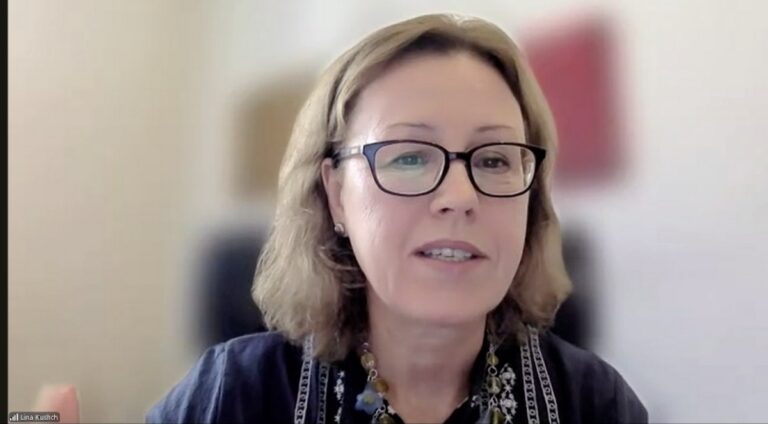
Together with her, the following joined the conversation:
Valeriya Muskharina, a journalist, editor of the NUJU Spilka News Telegram channel, and researcher of the survey The Mental State of Journalists: Editorial Practices That Work,
Yevheniya Virlych, the Editor-in-Chief of the Kherson publication called Kavun.City
Svitlana Zalizetska, the Editor-in-Chief of Zaporizhzhia called RIA-Pivden (formerly RIA-Melitopol).
The discussion focused on how Ukrainian newsrooms are seeking a balance between professional duty and their own resilience, learning to recognize colleagues’ emotional exhaustion and supporting one another.
A profession on the edge: when working means experiencing trauma every day
Ukrainian journalists do not just cover the war. They live in it, record the consequences of shelling, communicate with people whose stories often resonate with their own experience, and process videos from crime scenes where the media workers themselves or their loved ones could have been. And at the same time, they must remain objective, focused, and professional.
“Our colleagues not only cover events on the front line and highlight the consequences of russian crimes, but also experience these events every day together with their audience,” Lina Kushch emphasized. “In such conditions, taking care of mental health becomes a vital necessity: both for a person and for the newsroom as a whole.
The session at the Mental Health in Journalism Summit 2025 focused not on theoretical considerations, but on real survival practices. How do newsrooms build support systems? What works and what turns out to be insufficient? And most importantly, is it possible to prepare for work under the constant pressure of war?
Alarming numbers
As part of the project, the NUJU surveyed almost a hundred media workers from across the country and conducted 12 in-depth interviews with newsrooms that are actively implementing peer-to-peer support techniques.
“We asked journalists from across Ukraine how they feel after two and a half years of full-scale invasion,” said Valeriya Muskharina, presenting the results of the study. “The vast majority admit that they work in a state of constant emotional stress. Many experience signs of anxiety, burnout, or apathy, but continue to work.”
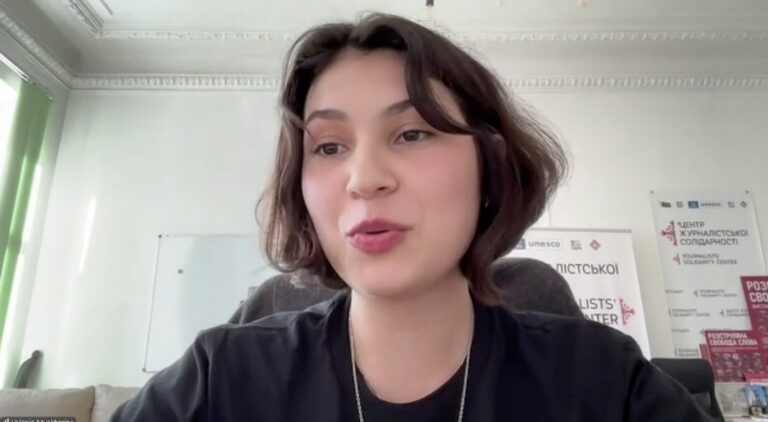
According to her, during the survey, journalists openly spoke about feelings of guilt for taking a break, fear of losing focus, and the risk of “falling out” of the news rhythm. Many do not have time to recover, as newsrooms operate with minimal staff and limited financial resources amid increased workloads since 2022. That is why, the researcher explained, caring for mental health is gradually ceasing to be a personal matter and is becoming a matter of professional ethics and the survival of the entire media community.
More than forty percent of the journalists surveyed, when working with traumatic content, go into “work mode”: they automatically turn off emotions in order to complete the task. Another third experience intense emotions, such as anger, anxiety, helplessness (according to colleagues, these feelings do not let them go even after finishing work). Every fifth media worker cannot get rid of thoughts about traumatic material, even at home. Work is invading personal space, blurring the lines between work and private life. “Many of our colleagues are seeking psychological help because they realize they can no longer cope on their own,” Valeriya Muskharina explained. “The war continues, and Ukrainians, including Ukrainian journalists, simply cannot keep it all to themselves.”
A third of the media workers who took part in the survey now live according to the principle of “here and now” and are unable to plan for the long term. These are, first of all, colleagues from the frontline and border areas with russia. Another third always leave room for adjustments in their plans, because they know that russian shelling can change everything. The war has changed not only the professional reality of journalists, but also transformed their attitude to life.
The largest group of journalists feels that they have become more emotionally vulnerable. Media workers noted that they react more sharply to stress, get tired faster, and lose their balance more easily. A quarter of the surveyed colleagues report a loss of sensitivity and emotional dullness, characterized by a person ceasing to react even to what previously worried them.
“One of the journalists I spoke to said that due to constant work after the first days of the full-scale invasion and until the winter of 2024, she worked 24/7,” Valeriya shared the story of one of the interviews. “It was really traumatic for her. Later, she went to the doctor, and she was diagnosed with health problems. As a result, the media worker was forced to leave her job and redirect her knowledge.
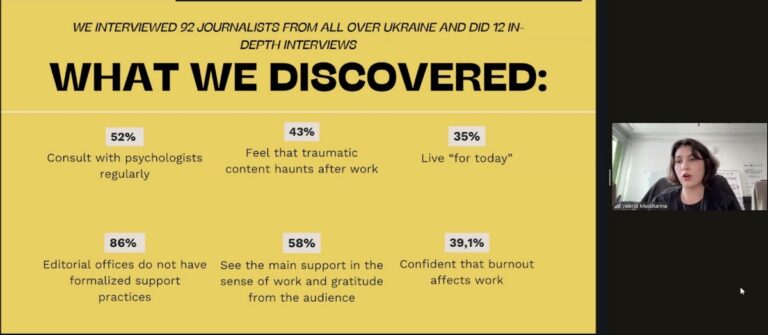
Survival practices: communication in the messenger supports morale
It is this invisible thread of mutual support that becomes a new form of collective therapy for teams.
“It is important for me that our team is ready for any situation,” said Lina Kushch. “During serious attacks on Kyiv, we stay in touch via messengers. Someone writes: ‘I am in shelter, everything is fine,’ others transmit news from different parts of the city. This is a way to keep each other’s morale up. Seeing that everyone is alive and continuing to work calms you and gives you strength.
The habit of being prepared for the worst, she says, has become the new norm of editorial life. Teams have shelter maps, generators, spare batteries, water canisters, and even agreed meeting places in case of a communication outage. But, according to Lina Kushch, technical preparation is only one of the survival strategies. The psychological component is no less important.
“One of our strategies is not to wait until it gets scary. We prepare for any scenarios in advance. Each member of our team has undergone intensive first-aid training. We learn to act calmly during a crisis because it gives a sense of control. Of course, we cannot influence external circumstances, but we can influence ourselves and the people around us,” she explained.
Such ‘survival practices’ have, over time, grown into a new culture of mutual care. Many Ukrainian newsrooms now have short morning meetings where journalists exchange a few words about how they are feeling. Some honestly say they are tired or haven’t slept; others share good news, and this, according to the first secretary of the NUJU, also helps.
Voices from the front: how the media works in Zaporizhia
The stories of editors Yevheniya Virlych from Kherson and Svitlana Zalizetska from Zaporizhia illustrate the scale of the challenges for Ukrainian journalists: from the loss of newsrooms during the occupation to the need to build new teams of displaced media workers, while simultaneously dealing with personal trauma and looking for ways to support colleagues.
“We felt the first stress when the enemy occupied the city of Melitopol. No one explained to us how to work when soldiers with weapons patrol the streets, cruise missiles fly over the city, and tanks drive on the roads. But even in these conditions, we continued to create news,” Svitlana Zalizetska told about the experience of working under occupation and the evacuation of the team from Melitopol, which russia still occupies.

“I personally went to resistance rallies and filmed videos,” the journalist adds. “Then many people were arrested, and the occupiers forced journalists to cooperate with them. Almost our entire team decided to leave Melitopol, because it was very dangerous to stay in the city.”
The newsroom lost everything: equipment, office, and access to the website. But the trauma was also personal. When Svitlana left for Zaporizhia, she thought the worst was behind her, but it was only the beginning.
“Russian soldiers took my father and kept him in prison, demanding that I return to Melitopol,” the editor recalls.
Thanks to the support of Ukrainian and international journalists, her father was released. But the challenges continued. In 2023, two of Svitlana’s colleagues who had not left occupied Melitopol were captured. They were Heorhii Levchenko, the administrator of the RIA-Melitopol telegram channel, and Anastasiya Hlukhovska, a journalist for the RIA-Melitopol website. They have been in captivity since then. Russia sentenced Heorhii to 16 years in prison. Anastasiya is in a pre-trial detention center in the Perm Oblast: the same place where Ukrainian journalist Viktoriya Roshyna was tortured to death…
“The arrest of my colleagues was a huge shock for me, and I couldn’t go outside or talk to anyone for a week. And at that moment, I realized I needed a psychologist’s help. I contacted a Red Cross specialist who helped me live and work again. Then my colleagues asked me, as an editor, to help them find a psychologist, too. First, I found support from donors, and then a specialist who supported the team,” recalled Svitlana.
Today, the displaced team works in Zaporizhzhia, 30 kilometers from the front line, under constant shelling. In total, more than 25 media workers from temporarily occupied and frontline areas are now part of their community.
Kherson – from occupation to resilience
Kherson journalist Yevheniya Virlych experienced the difficult events of the occupation of Kherson in 2022, including evacuations, shelling, and other hardships. These factors affected both her mental and physical health. At the same time, she emphasized that even during the occupation of Kherson, the team developed mechanisms to support mental well-being.
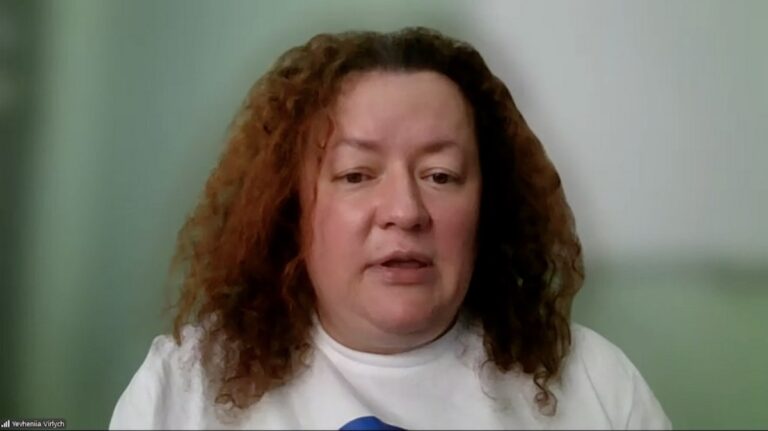
“We are a small team, and each of us knows the circumstances of others: personal, family, etc. The level of trust in our media is very high. This allows us to share problems and seek help quickly and effectively, she explained. “Anyone in the newsroom can come to me as an editor or to the entire team and ask for help, without being afraid to openly talk about difficulties.”
The newsroom of Kavun.City has developed internal policies for behavior in critical situations. Journalists live in Kherson, Kyiv, and Odesa, so they tell each other where they are going so that, in case of danger, others will know what to do. Yevheniya adds: if journalists cannot work due to circumstances or an attack, they can say so.
Support that is missing
The most alarming conclusion of the study: the absolute majority of newsrooms do not have formalized protocols for supporting mental health. That is, whether a journalist will receive psychological help depends not on the system but on the situation, the editor’s mood, and the availability of a budget at a given moment. Only a few newsrooms have documented support mechanisms.

“One of the editors said that they financed 10 psychological sessions for their entire staff to make life easier for their journalists,” Valeriya Muskharina also shared. “But there is an important point. They chose psychologists themselves because of a negative experience communicating with someone who did not know how to work specifically with journalists. And it was traumatic for some colleagues, because the psychologist simply did not understand what kind of traumas we are dealing with.”
This highlights another problem: it is not enough to simply provide access to a psychologist. We need specialists who understand the specifics of journalistic work, especially in wartime.
“Many of our colleagues work in small editorial teams. It is very difficult for them to delegate responsibilities internally,” Valeriya continued. “And the result of this is that one person becomes the one who does absolutely everything and, accordingly, burns out very quickly.”
According to the study’s results, after working with traumatic content, most journalists rely on rest, communication with loved ones, physical activity, or creativity. According to respondents, all of these are healthy ways to recover. But there is a critical problem: a small proportion seek professional psychological support (in particular due to the lack of grants).

Time to build a system of care for journalists
Valeriya Muskharina emphasized that the study is the beginning of a long-term project of the NUJU.
“Many of our colleagues are still not ready to discuss the topic of mental health, so it was really difficult for us to involve so many media professionals in our survey,” she admitted. “But we will do everything possible to collect many points of view and experience and present them on our digital platform, which we are currently developing together with international experts. Our goal is to show that the Ukrainian experience is unique and can be useful for colleagues from other regions of the world.”
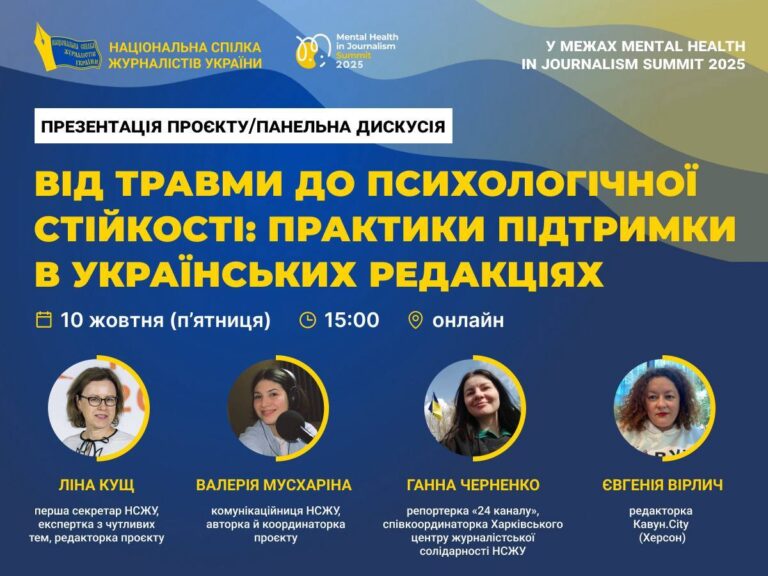
NUJU Information Service

 THE NATIONAL UNION OF
JOURNALISTS OF UKRAINE
THE NATIONAL UNION OF
JOURNALISTS OF UKRAINE
















Discussion about this post